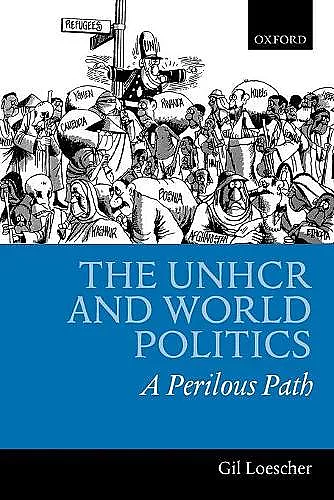The UNHCR and World Politics
A Perilous Path
Format:Paperback
Publisher:Oxford University Press
Published:24th May '01
Currently unavailable, and unfortunately no date known when it will be back
This paperback is available in another edition too:
- Hardback£157.50(9780198297161)

Over fifty years ago governments established the Office of the United Nations High Commissioner for Refugees (UNHCR) to protect the world's refugees. The UNHCR was created to be a human rights and advocacy organization. But governments also created the agency to promote regional and international stability and to serve the interests of states. Consequently, the UNHCR has always trod a perilous path between its mandate to protect refugees and asylum seekers and the demands placed upon it by states to be a relevant actor in world politics. This is the first independent history of the UNHCR. Gil Loescher, one of the world's leading experts on refugee affairs, draws upon decades of personal experience and research to examine the origins and evolution of the UNHCR as well as to identify many of the major challenges facing the organization in the years ahead. A key focus is to examine the extent to which the evolution of the UNHCR has been framed by the crucial events of international politics during the past half century and how, in turn, the actions of the eight past High Commissioners have helped shape the course of world history. Each chapter tells the story of an individual High Commissioner and examines the unique contributions made to the development of the Office. The history of the last fifty years shows how the UNHCR has initiated and capitalized on international political developments to progressively expand its scope and authority as an important actor in world politics. The book argues that the UNHCR has overstretched itself in recent decades and has strayed from its central human rights protection role. The protection of refugees remains a litmus test of the international community's commitment to defend human rights and to uphold liberal democratic values. Loescher offers a series of bold policy recommendations aimed at making the agency a more effective and accountable advocate for the millions of refugees in the world today.
Gill Loescher is overwhelmingly good on the decision-making of past High Commissioners as it relates to the international operations of the UNHCR, and the internal bureaucracy of the UNHCR insofar as this affects its operational capacity. In its detail on those operations Loescher's book does exactly what it says on the tin, and is the superlative modern political history of the UNHCR. * International and Comparative Law Quarterly *
Aside from being a masterful overview of UNHCR and the evolution of the refugee crisis over the last fifty years, this book is a remarkable example of the blending of disciplinary approaches. I should imagine it will be of particular value to postgraduates and academics in International Relations or Political Science, but will also prove valuable for scholars in related disciplines, including Geography, Sociology and History. It should also be required reading for every employee of UNHCR. It is well-written, smartly produced and the bibliography and index are valuable props. * Millennium: Journal of International Studies *
Gil Loescher provides the first systematic analysis of [the] remarkable transformation of the Office of the United Nations High Commissioner for Refugees (UNHCR) ... In writing this volume, he has had access to UNHCR documents and staff that I imagine is unique for an academic, and has also interviewed a number of the previous High Commissioners. Still, he has maintained his independence and has produced a balanced analysis that is critical when it is needed. * Millennium: Journal of International Studies *
ISBN: 9780199246915
Dimensions: 234mm x 157mm x 24mm
Weight: 646g
446 pages